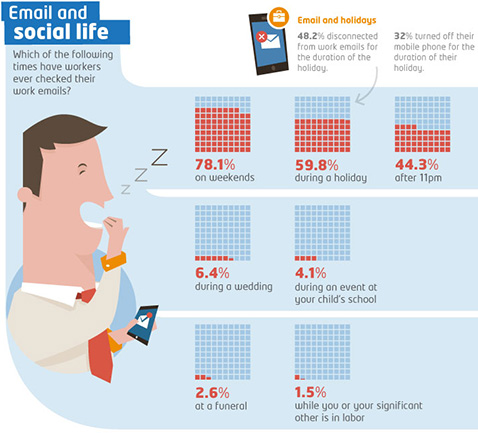How email user habits impact personal life
GFI Software announced the findings of its second independent study into email user habits, which revealed a stark increase in the way that work email is encroaching into the personal lives and downtime of staff. Of those surveyed, some 41% admit to checking work email at least once a day in their personal time, while 38% admit checking multiple times a day or in real-time through pre-work mornings, evenings, weekends and days off.

Building on the inaugural 2013 study, this year’s research into how employees interact with email expanded its focus to look at the impact of mobility and BYOD on email consumption. The survey found that 18% of those surveyed now use a smartphone or tablet as their primary device for sending and receiving email, thus ensuring that staff are wired into work email 24 hours a day, seven days a week unless they turn the device off.
The blind, independent study was conducted for GFI Software by Opinion Matters, surveying 500 UK workers from companies with up to 500 employees.
Key findings from the survey include:
- Outside of work hours, 41% of those surveyed check their work email at least once a day in personal time. A further 10.6% continue to check their email in real-time even before and after work
- Over a quarter of those surveyed (26.6%) respond to work email within 15 minutes or receiving it during work hours. A further 26.1% of respondents answer work email within half an hour during office hours
- When sending email, the same respondents are less fussy about response times, with only 8.6% expecting a reply inside 15 minutes and only 17% expecting one inside half an hour. Most expect a reply within a few hours (24.4%) or at least within a day (24.8%) of sending a message
- However, just under a third (31.4%) still resist the temptation to look in on their company email outside of the working day.
The survey revealed a substantial encroachment of work email not only into personal time, but also into social events and other milestone non-work occasions. For example:
- Almost 60% of those surveyed admit to checking work email while on holiday
- A further 6.4% have checked email during a wedding ceremony
- While attending an event at their child’s school, 4.1% have gone through work email
- Even during a funeral, 2.6% have checked mail
- -¦and 1.5% owned up to checking their work email while their spouse was in labour.
“Email is not just a critical business communications tool, but as the data shows it is relied on – perhaps too much – as a virtual filing cabinet and storage repository,” said Sergio Galindo, general manager of the Infrastructure Business Unit at GFI Software. “This kind of approach can all too easily breed an “out-of-sight, out-of-mind’ attitude towards email safety, security and backup, which is dangerous ground for any company to be on given the value of the data tied up in an organization’s mailboxes and the disruption that is caused when just one user suffers email disruption, let alone the whole company.”
The research data revealed that 61% use their email mailbox as a storage tool to file and retrieve documents, a potentially dangerous and ineffective way to manage email that creates over-size mailboxes that in turn become prone to data corruption, slow email performance and high server-side storage costs.
“The plus side is that despite the substantial encroachment of email into people’s personal lives, people continue to view email positively, with 85% of those surveyed considering email to be a blessing rather than a curse, which is a great endorsement of the technology and the way it is has transformed both business and personal communications,” Galindo added.
Ubiquitous availability of cheap smartphones, tablets and mobile connectivity has undoubtedly helped blur the boundaries between work and personal time. The survey data showed that 16% of respondents were using smartphones as their primary email device, with only 2% using tablets. With the cost of basic tablets already as low as £40, this is a surprising statistic.
The surge in mobile device use has made casual work email use harder to resist, with 33% using their mobile device to check email on holiday, while 23% have risked company email security by connecting their device to public Wi-Fi hotspots while away. Only a third (32%) turn off their smartphone while on holiday, although 48% claim they disable or otherwise disconnect work email from their phone for the duration of their time off.
The research also revealed that conventional desktop PCs continue to be the main device people use for dealing with email (54.6%) while laptops are a surprisingly distant second, used by 26.4% of respondents as their primary email device.